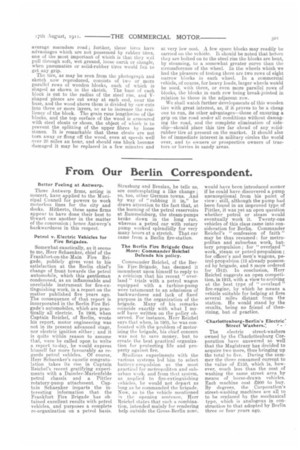From Our Berlin Correspondent.
Page 7

If you've noticed an error in this article please click here to report it so we can fix it.
Better Feeling at Antwerp.
Three Antwerp firms, acting in concert, have applied to the Municipal Council for powers to work motorbus lines for the city and docks. Hitherto, these same firms appear to have done their best to thwart one another in the matter of the concession ; hence Antwerp's backwardness in this respect.
Petrol v. Electric Vehicles for Fire Brigades.
Somewhat caustically, as it seems to me, Herr Schaenker, chief of the Frankfort-on-the-Main Fire Brigade, publicly gives vent to his satisfaction at the Berlin chief's change of front towards the petrol automobile, which this gentleman condemned, as an inflammable and unreliable instrument for fire-extinguishing work, in a report on the matter published five years ago. The consequence of that report is incorporated in the Berlin Fire Brigade's automobiles, which are practically all electric. In 1906, when Captain Reichel, of Berlin, wrote his report, motor engineering was not in its present advanced stage, nor electric ignition either ; and it is quite within reason to assume that, were he called upon to write a report to-day, he would express himself far more favourably as regards petrol vehicles. Of course, Herr Schaenker's caustic congratulation takes its rise in Captain lleichel's recent gratifying experiments with a Daimler-Marienfelde petrol chassis and a Pittler rotatory-pump attachment. Captain Schaenker imparts the interesting information that the Frankfort Fire Brigade has obtained excellent results with petrol vehicles, and purposes a complete re-organization on a petrol basis.
Strasburg and Breslau, he tells us, are contemplating a like change ; so, too, other German towns. And by way of "rubbing it in," he draws attention to the fact that, at the burning of the petrol reservoirs at Rummelsburg, the steam-pumps broke down in the long run, whereas a petrol car with rotary pump worked splendidly for very many hours at a stretch. That car came from a Berlin fire-station.
The Berlin Fire Brigade Once More: Commander Reichel Defends his policy.
Commander Reichel, of the Berlin Fire-Brigade, has deemed it incumbent upon himself to reply to a criticism that his recent " overland " trials with a petrol wagon equipped with a. turbine-pump were tatamount to an admission of backwardness and lack of fixed purpose in the organization of the brigade. Many of his remarks coincide exactly with what I myself have written on the policy observed. For instance, Herr Reichel says that when, in 1905, he was confronted with the problem of motorizing the brigade, his chief concern was not to save money, but to create the best practical organization for protecting life and property against fire.
Studious experiments with the various systems led him to select battery-propulsion as the most practical for metropolitan and suburban work, and from that system, as applied to fire-extinguishing vehicles, he would not depart as long as he commanded the brigade. Now, as to the vehicle mentioned in the opening sentence, Herr Reichel states that such a combination, intended mainly for rendering help outside the Gross-Berlin zone,
would have been introduced sooner if he could have discovered a pump unexceptional from his point of view: still, although the pump had been found in an improved type of Pittler, it was yet an open question whether petrol or steam would eventually work it. Twenty-one vehicles of this class came into consideration for Berlin. Commander Reichers " confession of faith " may be thus resumed : for metropolitan and suburban work, battery propulsion ; for " overland " work, steam or petrol-propulsion ; for officer's and men's wagons, petrol-propulsion (13 already possessed by brigade, and 8 more ordered for 1D12). In conclusion, Herr Reichel suggests an open competition, in 1913, with a view to arriving at the best type of " overland" fire-engine, by which he means a vehicle suitable for helping at fires several miles distant from the station. He would stand by the results, being no friend of theorizing, but of practice.
Charlottenburg-Berlin's Electric',
The electric street-washers owned by the Charlottenburg Corporation have answered so well that the Magistracy has decided to acquire two more, thus bringing up the total to five. During the summer the three consumed current to the value of 2150, which is, however, much less than the cost of washing the same street area by means of horse-drawn vehicles. Each machine cost 2900 to buy. By degrees, the .Corporation's street-washing machines are all to to be replaced by the mechanical type, which is analogous in construction to that adopted by Berlin three or four years ago.




















